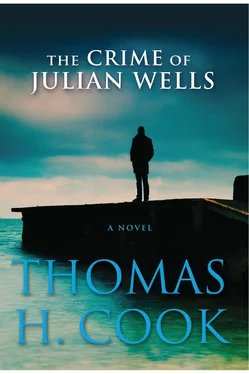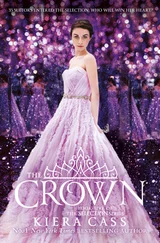Thomas Cook - The Crime of Julian Wells
Здесь есть возможность читать онлайн «Thomas Cook - The Crime of Julian Wells» весь текст электронной книги совершенно бесплатно (целиком полную версию без сокращений). В некоторых случаях можно слушать аудио, скачать через торрент в формате fb2 и присутствует краткое содержание. Год выпуска: 2012, ISBN: 2012, Издательство: Grove Press, Жанр: Криминальный детектив, на английском языке. Описание произведения, (предисловие) а так же отзывы посетителей доступны на портале библиотеки ЛибКат.
- Название:The Crime of Julian Wells
- Автор:
- Издательство:Grove Press
- Жанр:
- Год:2012
- ISBN:9780802194589
- Рейтинг книги:5 / 5. Голосов: 1
-
Избранное:Добавить в избранное
- Отзывы:
-
Ваша оценка:
- 100
- 1
- 2
- 3
- 4
- 5
The Crime of Julian Wells: краткое содержание, описание и аннотация
Предлагаем к чтению аннотацию, описание, краткое содержание или предисловие (зависит от того, что написал сам автор книги «The Crime of Julian Wells»). Если вы не нашли необходимую информацию о книге — напишите в комментариях, мы постараемся отыскать её.
The Crime of Julian Wells — читать онлайн бесплатно полную книгу (весь текст) целиком
Ниже представлен текст книги, разбитый по страницам. Система сохранения места последней прочитанной страницы, позволяет с удобством читать онлайн бесплатно книгу «The Crime of Julian Wells», без необходимости каждый раз заново искать на чём Вы остановились. Поставьте закладку, и сможете в любой момент перейти на страницу, на которой закончили чтение.
Интервал:
Закладка:
“It feels like I’m always in the presence of an unquiet ghost,” I added as we walked over to a nearby bench and sat down.
“Well, he was unquiet, that’s for sure,” Loretta said. “Usually he came home quite tired, but this time was different. It was as if some vicious little animal were clawing around inside him.”
I glanced out into the park, where scores of strollers were making their way along its deeply shaded paths. “My mind keeps bringing things to the surface. Little bits of memory that swirl and coalesce and pick up other little bits.”
She clearly saw the troubling aspect of this. “What little bits?” she asked.
“That dedication in his first book, for example,” I said. “That I was the ‘sole witness’ to his crime.” I shrugged. “I don’t remember witnessing any crime. I thought he meant his writing of the book, which I’d advised against. But now, I’m not so sure that that’s the ‘crime’ Julian meant.”
This last remark clearly connected to something in Loretta’s mind.
“You know, it’s strange, but for all the dreadful acts Julian wrote about, I don’t think he ever witnessed a crime of any sort.” Her gaze drifted over to one of the great gray stones of the park, children scooting down its smoothly rounded surface. “I wonder how he would have reacted if he’d ever actually seen an atrocity like the one at Oradour.” She looked at me. “Psychologically, he might not have been able to survive it. Primo Levi killed himself, remember? Tadeusz Borowski, too.”
“But they were the victims of a great crime,” I reminded her. “Not people who had done some awful thing. They didn’t die of guilt. They died because they were unable to bear the suffering they’d seen.”
“Well, Julian had certainly seen plenty of suffering,” Loretta said. “But I don’t think that was the source of his agitation.”
“Then what was?” I asked.
Loretta remained silent for a time, thinking something through. Then she said, “Julian and I were sitting in the yard at Montauk a few days before he died. I looked over at him. Looked closely at his face. There were these deep lines. And his eyes looked sunken. I said, ‘You know, Julian, the crimes you’ve written about are carved into your face.’”
Loretta was right. Julian’s features did seem to bear the imprint of Cuenca and Oradour, the castle ruins of Brittany and C?achtice, the bleak wastes of the Ukraine.
“His response was strange,” Loretta said. “He said, ‘No, only the one I’ll never write about.’”
As if once again on that rainy street, I saw Julian turn up his collar, pull down his hat, and wave me under the awning of a small store on Avenida de la Republique. He’d grasped my arm fiercely, then asked if I’d heard from Marisol.”
“Do you suppose it could have been Marisol’s disappearance?” I asked. “I mean, he was looking at a map of Argentina, after all.”
“I suppose that could have been the crime,” Loretta said.
“But what would keep him from writing about that?” I asked.
Loretta’s look reminded me of a fictional detective in some old noir classic.
“Did Julian love her?” she asked.
“No,” I answered. “He cared for her, certainly. But he didn’t fall in love with her.”
“Did you?”
“No,” I said.
With that answer, I heard Marisol’s voice again: Our time on earth is divvied out like stolen things, a booty of nights and days.
“But there was something compelling about her,” I added.
“That Julian saw?”
“Yes, of course,” I said. “And he did everything he could to find her. But people simply vanished in those days.”
Vanished, yes, I thought, but why had she vanished? For me, this had always been the mysterious part of Marisol’s disappearance, that it had remained so thoroughly unaccountable. Her body had never been found, and thus it was unlikely that she’d been the victim of an ordinary murder. But neither would she have been a likely target of the country’s political repression. What had she done, after all, except work as a guide and study dress design and occasionally express some opinion about a writer or a style of dance? Of all the people I had ever known, she had seemed to me the most innocent.
“The thing about Marisol,” I said, “is that she wasn’t at all political. She was smart and ambitious, a hard worker. She had a way about her, a knowingness, but in every other way, there were thousands like her in Buenos Aires at that time.”
“Thousands who were like her but who didn’t disappear,” Loretta said.
I nodded. “Yes.”
With that answer, there seemed little to do but change the subject.
“Anything more from Rene?” I asked.
“Yes,” Loretta said. “An e-mail, if you can believe it. I never met him, but Julian’s description didn’t suggest a man who’s ever been computer savvy.” She looked somewhat puzzled. “He wasn’t at all surprised by Julian’s death. That he killed himself. Rene likes to use English phrases. He said Julian was ‘a burned-out case.’”
Suddenly, I felt somewhat like one myself, a man who’d lost his wife to disease and his friend to suicide, both irreplaceable, a childless man whose father would soon be passing, a man with a small apartment who practiced a dying profession.
I tried to shrug off the darkness that settled over me with these thoughts. “So, what else did Rene say?”
“He wanted to know what he should do with Julian’s stuff,” Loretta answered. “Whatever he had in his apartment.”
The thought of Rene rifling through Julian’s possessions struck me as profoundly wrong. Should it not be someone else, someone close to Julian, who did this? These were the personal possessions of a very private person, after all, a man I’d loved and whose work I’d admired and with whom I’d traveled some small portion of the world.
“Would you mind if I did it?” I asked Loretta.
She leaned back slightly. “You mean go to Paris?”
I nodded. “Rene will just throw everything into the garbage,” I said. “And somehow that just doesn’t seem the right end for Julian’s things.”
Loretta smiled softly. “You truly loved him, didn’t you?” she asked.
A fierce emotion stirred in me.
“I did, yes,” I said. “And more than anything, Loretta, I wish I could have been with him in that little boat.”
“I’m going to Paris,” I told my father the next day.
The two of us were sitting at the small breakfast table over morning coffee.
“I need to go through Julian’s things,” I added.
It surprised me that in response to this, my father abruptly sank directly back to his own past.
“I never got to travel much in my job,” he said quietly, then drew in a long breath and released it slowly, “but I did find myself at the Nile Hotel once. In Kambala. Idi Amin was still in power in those days.”
Something in his recollection of that time clearly pained him, but he faced it bravely and went on.
“Everybody knew that Amin had several suites in the hotel,” he said. “Some were for his whores. Others were torture chambers.”
It was the latter rooms he appeared to visualize now, and I found myself seeing them, too: walls splattered with dried blood, a straight-back chair, a naked lightbulb hanging from a black cord, a metal table fitted with drains. Hell is not other people, I thought, in opposition to Sartre’s famous line; it is what we do to other people.
“I was at the hotel when he put Archbishop Luwum on trial there,” my father continued. “I tried to get my superiors to intervene, but they said it was none of our affair, and besides, dreadful as Amin was, he was no different from others. ‘The Africans don’t have presidents,’ one of them told me. ‘They have chiefs.’ Mobutu said that, too, by the way, as justification for his own slaughters.” He shrugged. “Well, Amin charged Luwum with smuggling guns, if you can believe that, and tried him out in the open, African-style, in the courtyard of the hotel. He’d filled the place with his rabble of soldiers. They were drinking whiskey and chewing khat, and they kept screaming, ‘Kill him! Kill him!’ Luwum just stood there, not saying a word, just staring that fat, whoremongering Kakwa thug right in the eye.” His gaze intensified and bore into me. “That’s what Julian should have looked for and written about, Philip,” he said. “Men like Luwum. Men who were doing some good in the world.”He shrugged. “Julian’s tragedy is that he only looked at the dark side, and it weakened him and made him sick.”
Читать дальшеИнтервал:
Закладка:
Похожие книги на «The Crime of Julian Wells»
Представляем Вашему вниманию похожие книги на «The Crime of Julian Wells» списком для выбора. Мы отобрали схожую по названию и смыслу литературу в надежде предоставить читателям больше вариантов отыскать новые, интересные, ещё непрочитанные произведения.
Обсуждение, отзывы о книге «The Crime of Julian Wells» и просто собственные мнения читателей. Оставьте ваши комментарии, напишите, что Вы думаете о произведении, его смысле или главных героях. Укажите что конкретно понравилось, а что нет, и почему Вы так считаете.












